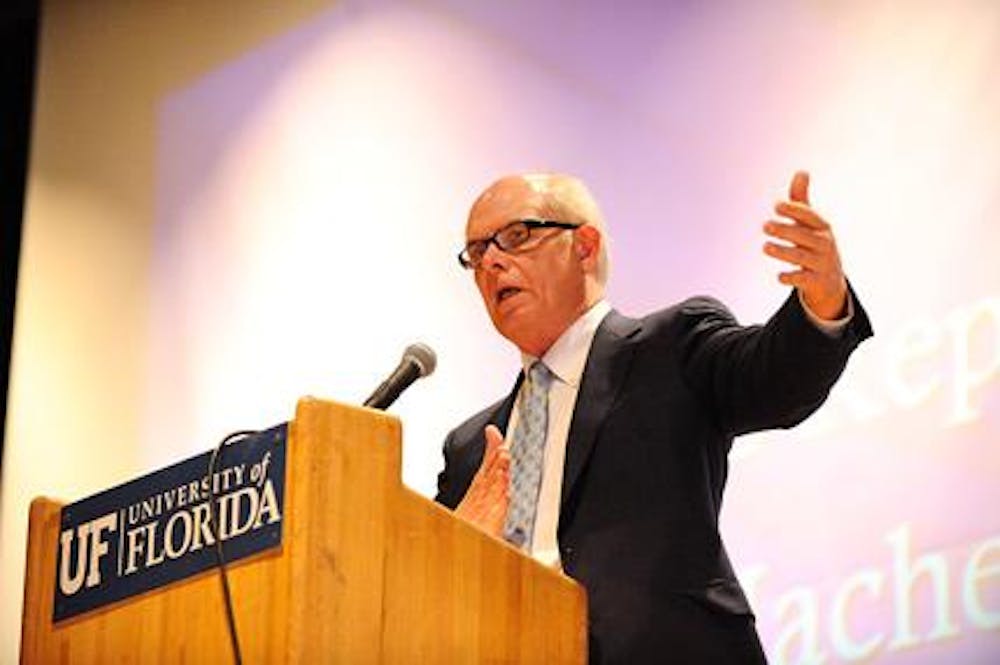UF could rake in hundreds of millions of dollars from the $787 billion stimulus package signed by President Barack Obama on Tuesday but, then again, the number could be much lower.
"It's been like a scavenger hunt, we've been looking under rocks and trying to figure out where we are," UF President Bernie Machen told the Faculty Senate on Thursday before announcing that UF will adjust its budget-cutting schedule because of the uncertainty swirling around the new legislation.
It's just not clear, he told faculty, if the stimulus package will offset state budget cuts enough to soften the possible $72 to $75 million blow to UF's budget next year.
As a result, Machen said colleges and administrative units will have another month to prepare the 10 percent budget cut proposals he requested from them in January.
This will give UF more time to analyze the situation, he said.
Instead of being due on March 4, proposals will have to be in by April 1, and they will be publicized at the Faculty Senate meeting April 15 , he said.
In the meantime, UF will be requesting $420 million in stimulus money, mainly for energy-efficiency modifications.
The rest, about $43 million, is pegged for fire and safety code compliance and other building upgrades.
In an interview before the Senate meeting, Machen said UF has only submitted requests for infrastructure because those are the only requests it's been asked to submit so far.
He said he doesn't expect all of the almost 40 projects to be funded and has no idea when UF could get the money for the ones that do get funded.
When all is said and done, Machen said he's not expecting the bill to be a panacea for UF.
"My personal opinion, and I'm pretty conservative, is that the stimulus package is not gonna help our budget situation," he said.
"There is enough uncertainty, however, that I'm gonna lag the roll-out (of budget cut proposals) for a month," he said.
By then, the state may have a better idea of how much money it might receive from the stimulus and how these could affect the budget. Machen said estimates for the state's share of the bill range from $2 billion to $29 billion, though $12 billion is a commonly cited figure.
But Gov. Charlie Crist's budget recommendations, set to be released today, should include some clues as to how big that number could be, he said.
Even so, the final state budget, which will determine the actual size of UF's budget cuts, won't be available until the end of the spring legislative session, which concludes May 1.
Machen said at the meeting that another variable to consider is the differential tuition bill approved by the state Senate's Higher Education Committee on Wednesday. The bill, if approved by the Legislature, would allow universities to raise tuition by up to 15 percent a year until they reach the national average. UF can currently raise tuition on some students, but the bill would allow UF to hike all tuition, which could bring in about $24 million next year, or about $12 million more than tuition hikes could have raised under the existing law.
"It's huge for us," Machen said. "It is the first time that we will have the ability to semi-regulate our revenues on the tuition side," he said.
He said UF is also expecting an increase in research grants from the stimulus, but they won't affect UF's budget.
Among other appropriations, the bill sets aside $10 billion for the National Institutes of Health and $3 billion for the National Science Foundation.
UF will be able to compete for grants from these agencies, and Machen said faculty are scurrying to prepare grant requests in anticipation of the extra funding.
While faculty can rejoice in the prospect of more grant money, needy students can take comfort in the increases in financial aid.
Funding for Pell Grants will be increased by $15.6 billion over two years beginning July 1. As a result, the maximum Pell Grant award will be increased by about $500 to $5,350 for the 2009-2010 year.
At UF, 8,016 students received Pell Grants in 2007-2008, said Karen Fooks, director of UF's Student Financial Affairs.
Nationally, about 5.4 million students received Pell Grants in 2007-2008, according to the Department of Education Web site, with a total of $16.2 billion distributed in 2008.
The Federal Work-Study Program, which had a budget of $1.17 billion in 2008, will also get a $200 million boost over two years under the stimulus package.
In 2007-2008, 1,048 students at UF were enrolled in the program, Fooks said.
Nationally, about 793,000 students were enrolled during the same period.
A higher education tax credit included in the bill will also increase from $1,800 to $2,500, the amount students and their families can claim for education costs on their tax returns. The change will also make families with higher incomes eligible for the credit, which will modify the existing Hope Scholarship Tax Credit. The new credit, which will go into effect this year, will last for two years, according to a Department of Education spokeswoman.
Fooks said it's too soon to tell how the financial aid provisions in the bill will affect UF students but said the most obvious impact will come from the increase in Pell Grant funding.
In other news, senators at Thursday's meeting passed a resolution opposing Gainesville Charter Amendment 1, which would legalize discrimination based on gender identity. UF's Student Senate passed a similar resolution on Wednesday.






